Unit 35: Developing Individuals, Teams, Organisations and HR Report
VerifiedAdded on 2023/01/05
|21
|5673
|73
Report
AI Summary
This report delves into the essential skills, knowledge, and behaviors required of Human Resource (HR) professionals, particularly within the context of M&S. It explores the importance of these attributes for effective management and organizational growth. The report includes a personal skills audit and SWOT analysis to create a professional development plan for an HR manager. It differentiates between organizational and individual learning, training, and development, emphasizing the need for continuous learning to drive sustainable business performance. Furthermore, the report examines ways to support and engage employees in specific situations and explores various performance management approaches. The document provides a comprehensive overview of HR development, highlighting key aspects for professionals in the field.
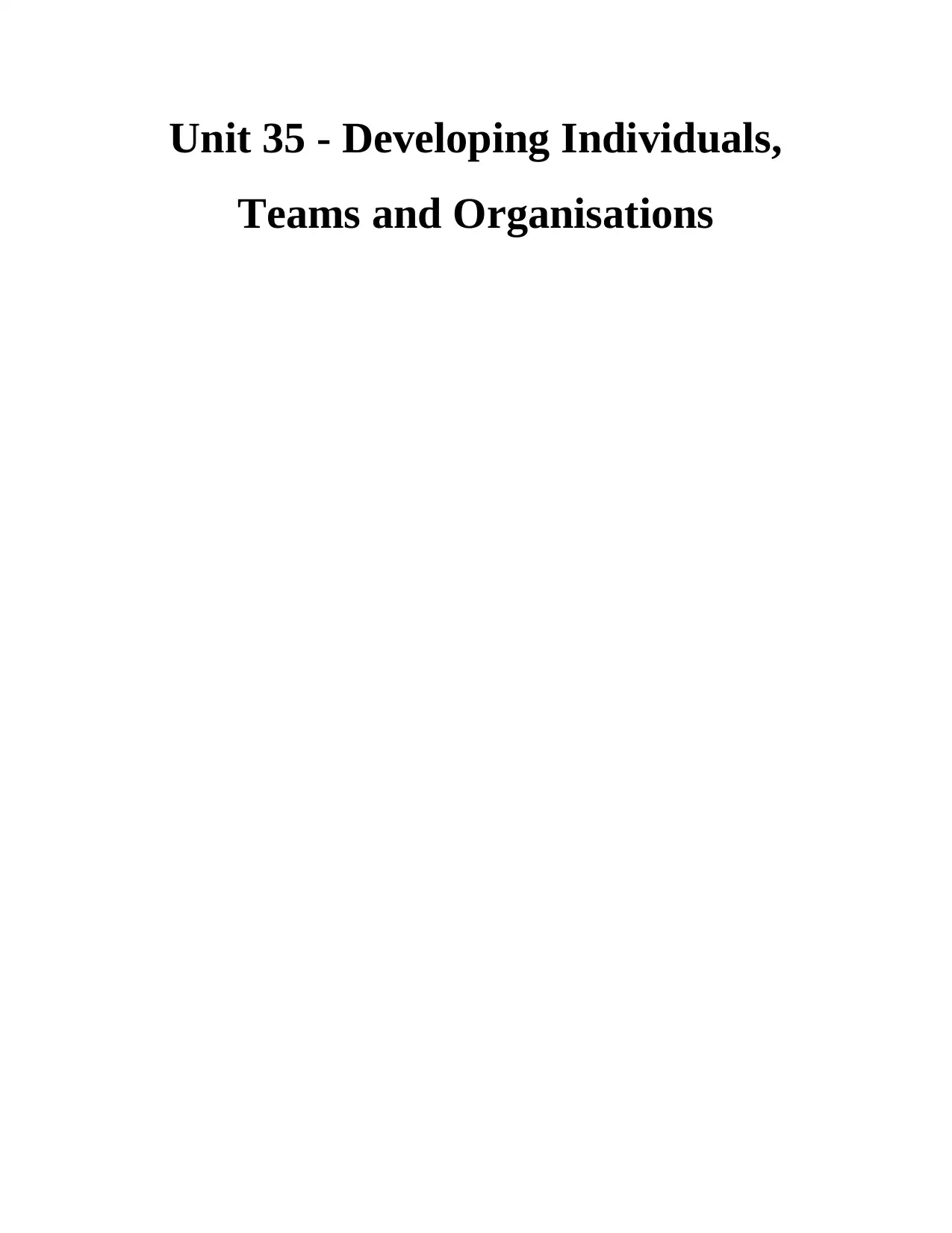
Unit 35 - Developing Individuals,
Teams and Organisations
Teams and Organisations
Paraphrase This Document
Need a fresh take? Get an instant paraphrase of this document with our AI Paraphraser
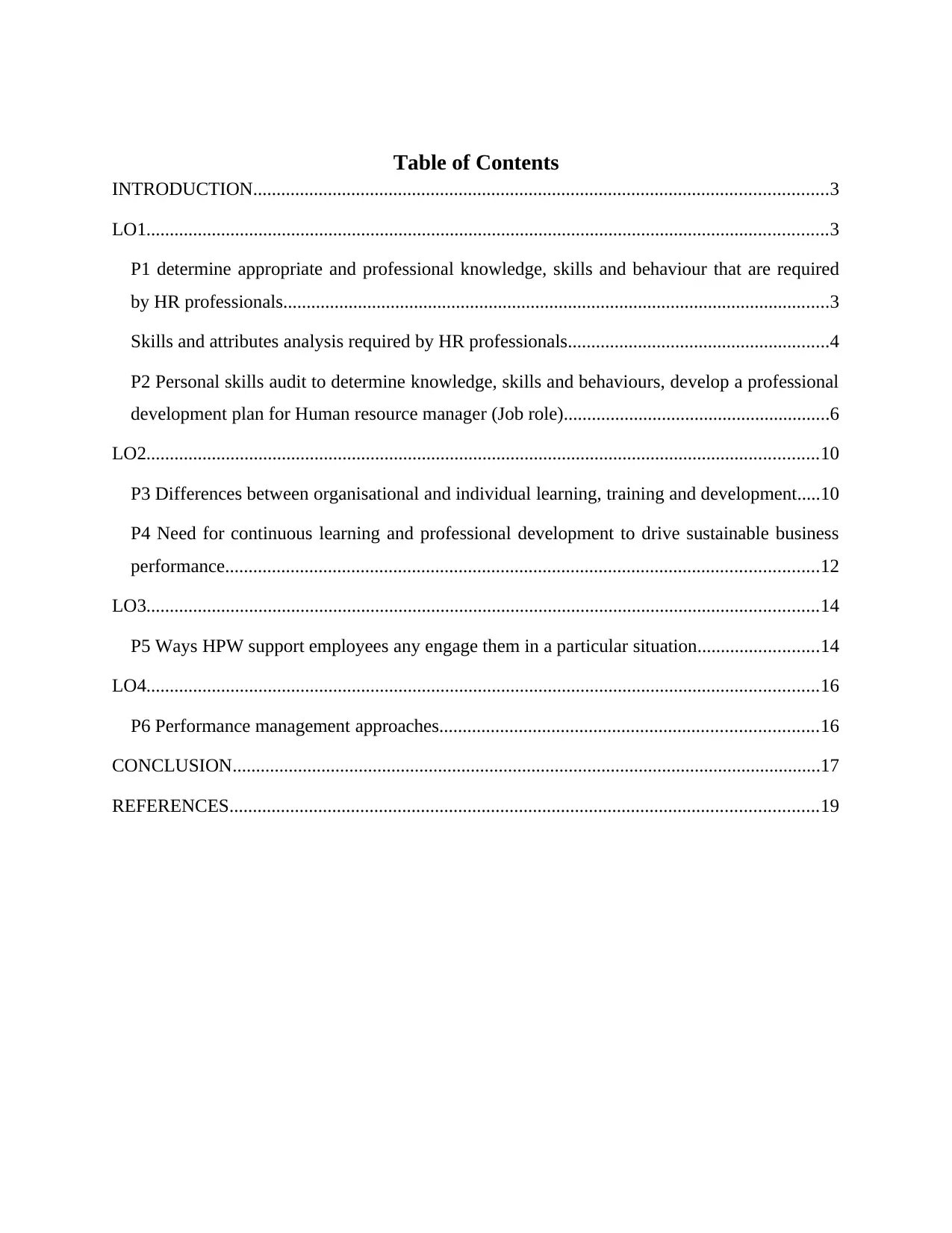
Table of Contents
INTRODUCTION...........................................................................................................................3
LO1..................................................................................................................................................3
P1 determine appropriate and professional knowledge, skills and behaviour that are required
by HR professionals.....................................................................................................................3
Skills and attributes analysis required by HR professionals........................................................4
P2 Personal skills audit to determine knowledge, skills and behaviours, develop a professional
development plan for Human resource manager (Job role).........................................................6
LO2................................................................................................................................................10
P3 Differences between organisational and individual learning, training and development.....10
P4 Need for continuous learning and professional development to drive sustainable business
performance...............................................................................................................................12
LO3................................................................................................................................................14
P5 Ways HPW support employees any engage them in a particular situation..........................14
LO4................................................................................................................................................16
P6 Performance management approaches.................................................................................16
CONCLUSION..............................................................................................................................17
REFERENCES..............................................................................................................................19
INTRODUCTION...........................................................................................................................3
LO1..................................................................................................................................................3
P1 determine appropriate and professional knowledge, skills and behaviour that are required
by HR professionals.....................................................................................................................3
Skills and attributes analysis required by HR professionals........................................................4
P2 Personal skills audit to determine knowledge, skills and behaviours, develop a professional
development plan for Human resource manager (Job role).........................................................6
LO2................................................................................................................................................10
P3 Differences between organisational and individual learning, training and development.....10
P4 Need for continuous learning and professional development to drive sustainable business
performance...............................................................................................................................12
LO3................................................................................................................................................14
P5 Ways HPW support employees any engage them in a particular situation..........................14
LO4................................................................................................................................................16
P6 Performance management approaches.................................................................................16
CONCLUSION..............................................................................................................................17
REFERENCES..............................................................................................................................19
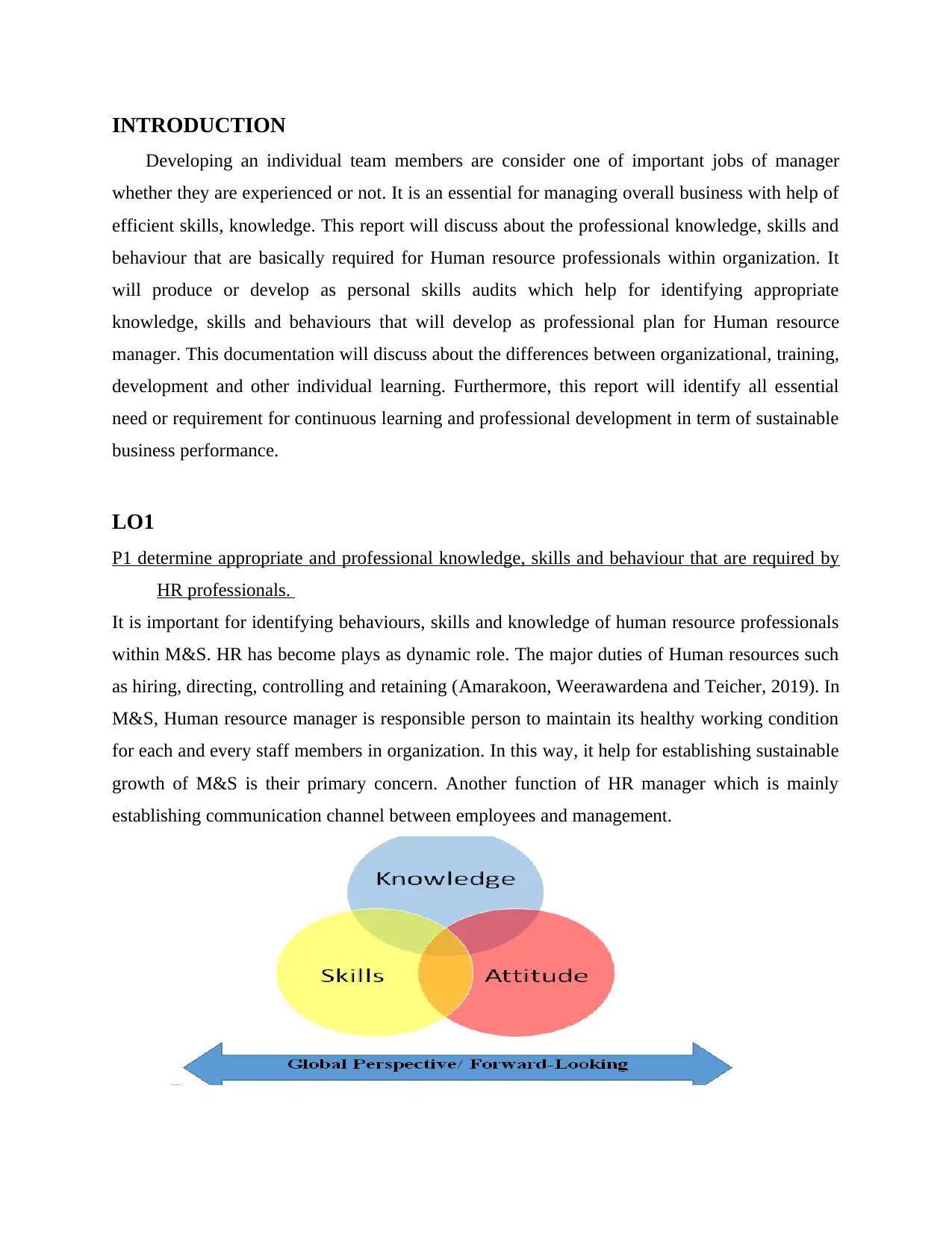
INTRODUCTION
Developing an individual team members are consider one of important jobs of manager
whether they are experienced or not. It is an essential for managing overall business with help of
efficient skills, knowledge. This report will discuss about the professional knowledge, skills and
behaviour that are basically required for Human resource professionals within organization. It
will produce or develop as personal skills audits which help for identifying appropriate
knowledge, skills and behaviours that will develop as professional plan for Human resource
manager. This documentation will discuss about the differences between organizational, training,
development and other individual learning. Furthermore, this report will identify all essential
need or requirement for continuous learning and professional development in term of sustainable
business performance.
LO1
P1 determine appropriate and professional knowledge, skills and behaviour that are required by
HR professionals.
It is important for identifying behaviours, skills and knowledge of human resource professionals
within M&S. HR has become plays as dynamic role. The major duties of Human resources such
as hiring, directing, controlling and retaining (Amarakoon, Weerawardena and Teicher, 2019). In
M&S, Human resource manager is responsible person to maintain its healthy working condition
for each and every staff members in organization. In this way, it help for establishing sustainable
growth of M&S is their primary concern. Another function of HR manager which is mainly
establishing communication channel between employees and management.
Developing an individual team members are consider one of important jobs of manager
whether they are experienced or not. It is an essential for managing overall business with help of
efficient skills, knowledge. This report will discuss about the professional knowledge, skills and
behaviour that are basically required for Human resource professionals within organization. It
will produce or develop as personal skills audits which help for identifying appropriate
knowledge, skills and behaviours that will develop as professional plan for Human resource
manager. This documentation will discuss about the differences between organizational, training,
development and other individual learning. Furthermore, this report will identify all essential
need or requirement for continuous learning and professional development in term of sustainable
business performance.
LO1
P1 determine appropriate and professional knowledge, skills and behaviour that are required by
HR professionals.
It is important for identifying behaviours, skills and knowledge of human resource professionals
within M&S. HR has become plays as dynamic role. The major duties of Human resources such
as hiring, directing, controlling and retaining (Amarakoon, Weerawardena and Teicher, 2019). In
M&S, Human resource manager is responsible person to maintain its healthy working condition
for each and every staff members in organization. In this way, it help for establishing sustainable
growth of M&S is their primary concern. Another function of HR manager which is mainly
establishing communication channel between employees and management.
⊘ This is a preview!⊘
Do you want full access?
Subscribe today to unlock all pages.

Trusted by 1+ million students worldwide
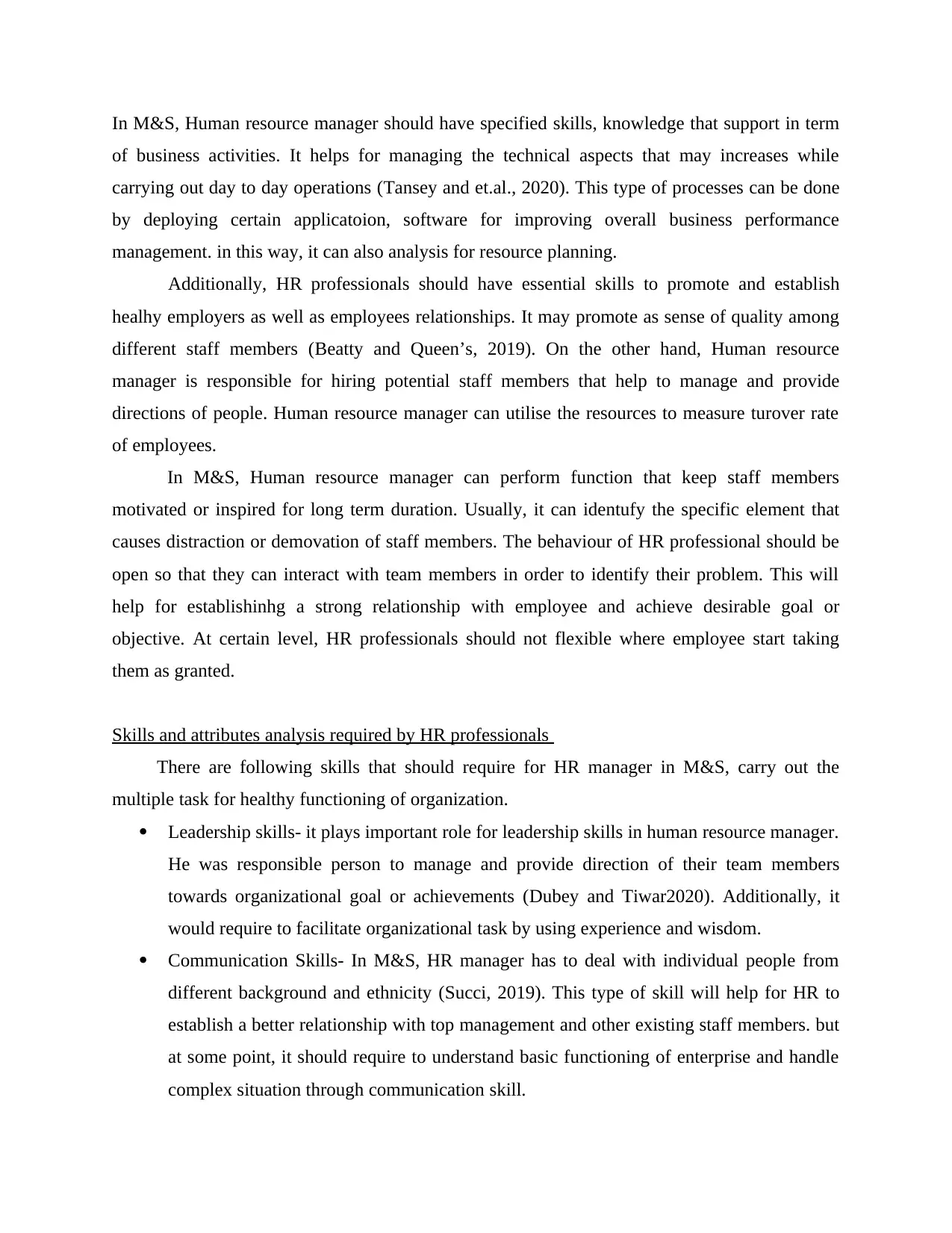
In M&S, Human resource manager should have specified skills, knowledge that support in term
of business activities. It helps for managing the technical aspects that may increases while
carrying out day to day operations (Tansey and et.al., 2020). This type of processes can be done
by deploying certain applicatoion, software for improving overall business performance
management. in this way, it can also analysis for resource planning.
Additionally, HR professionals should have essential skills to promote and establish
healhy employers as well as employees relationships. It may promote as sense of quality among
different staff members (Beatty and Queen’s, 2019). On the other hand, Human resource
manager is responsible for hiring potential staff members that help to manage and provide
directions of people. Human resource manager can utilise the resources to measure turover rate
of employees.
In M&S, Human resource manager can perform function that keep staff members
motivated or inspired for long term duration. Usually, it can identufy the specific element that
causes distraction or demovation of staff members. The behaviour of HR professional should be
open so that they can interact with team members in order to identify their problem. This will
help for establishinhg a strong relationship with employee and achieve desirable goal or
objective. At certain level, HR professionals should not flexible where employee start taking
them as granted.
Skills and attributes analysis required by HR professionals
There are following skills that should require for HR manager in M&S, carry out the
multiple task for healthy functioning of organization.
Leadership skills- it plays important role for leadership skills in human resource manager.
He was responsible person to manage and provide direction of their team members
towards organizational goal or achievements (Dubey and Tiwar2020). Additionally, it
would require to facilitate organizational task by using experience and wisdom.
Communication Skills- In M&S, HR manager has to deal with individual people from
different background and ethnicity (Succi, 2019). This type of skill will help for HR to
establish a better relationship with top management and other existing staff members. but
at some point, it should require to understand basic functioning of enterprise and handle
complex situation through communication skill.
of business activities. It helps for managing the technical aspects that may increases while
carrying out day to day operations (Tansey and et.al., 2020). This type of processes can be done
by deploying certain applicatoion, software for improving overall business performance
management. in this way, it can also analysis for resource planning.
Additionally, HR professionals should have essential skills to promote and establish
healhy employers as well as employees relationships. It may promote as sense of quality among
different staff members (Beatty and Queen’s, 2019). On the other hand, Human resource
manager is responsible for hiring potential staff members that help to manage and provide
directions of people. Human resource manager can utilise the resources to measure turover rate
of employees.
In M&S, Human resource manager can perform function that keep staff members
motivated or inspired for long term duration. Usually, it can identufy the specific element that
causes distraction or demovation of staff members. The behaviour of HR professional should be
open so that they can interact with team members in order to identify their problem. This will
help for establishinhg a strong relationship with employee and achieve desirable goal or
objective. At certain level, HR professionals should not flexible where employee start taking
them as granted.
Skills and attributes analysis required by HR professionals
There are following skills that should require for HR manager in M&S, carry out the
multiple task for healthy functioning of organization.
Leadership skills- it plays important role for leadership skills in human resource manager.
He was responsible person to manage and provide direction of their team members
towards organizational goal or achievements (Dubey and Tiwar2020). Additionally, it
would require to facilitate organizational task by using experience and wisdom.
Communication Skills- In M&S, HR manager has to deal with individual people from
different background and ethnicity (Succi, 2019). This type of skill will help for HR to
establish a better relationship with top management and other existing staff members. but
at some point, it should require to understand basic functioning of enterprise and handle
complex situation through communication skill.
Paraphrase This Document
Need a fresh take? Get an instant paraphrase of this document with our AI Paraphraser
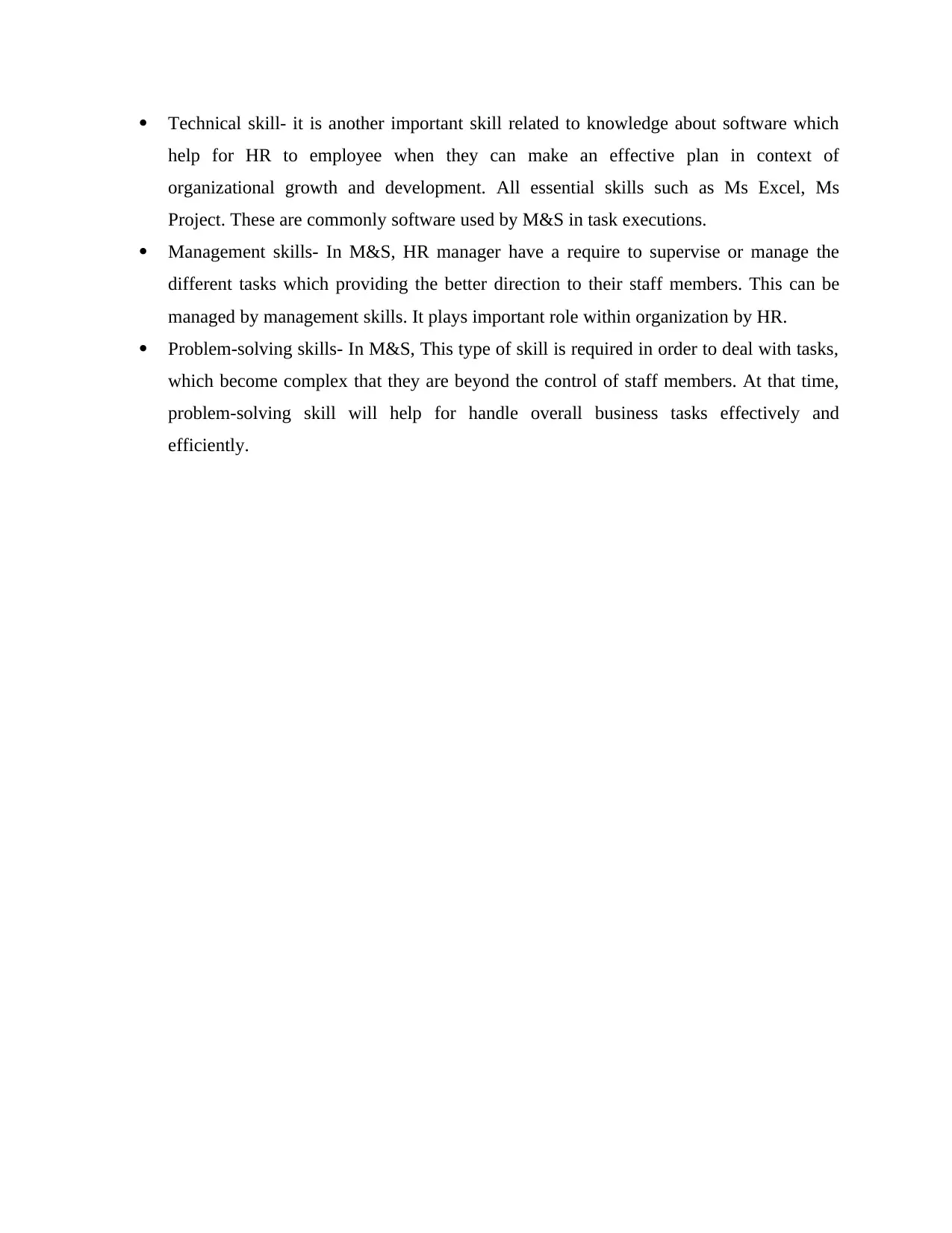
Technical skill- it is another important skill related to knowledge about software which
help for HR to employee when they can make an effective plan in context of
organizational growth and development. All essential skills such as Ms Excel, Ms
Project. These are commonly software used by M&S in task executions.
Management skills- In M&S, HR manager have a require to supervise or manage the
different tasks which providing the better direction to their staff members. This can be
managed by management skills. It plays important role within organization by HR.
Problem-solving skills- In M&S, This type of skill is required in order to deal with tasks,
which become complex that they are beyond the control of staff members. At that time,
problem-solving skill will help for handle overall business tasks effectively and
efficiently.
help for HR to employee when they can make an effective plan in context of
organizational growth and development. All essential skills such as Ms Excel, Ms
Project. These are commonly software used by M&S in task executions.
Management skills- In M&S, HR manager have a require to supervise or manage the
different tasks which providing the better direction to their staff members. This can be
managed by management skills. It plays important role within organization by HR.
Problem-solving skills- In M&S, This type of skill is required in order to deal with tasks,
which become complex that they are beyond the control of staff members. At that time,
problem-solving skill will help for handle overall business tasks effectively and
efficiently.
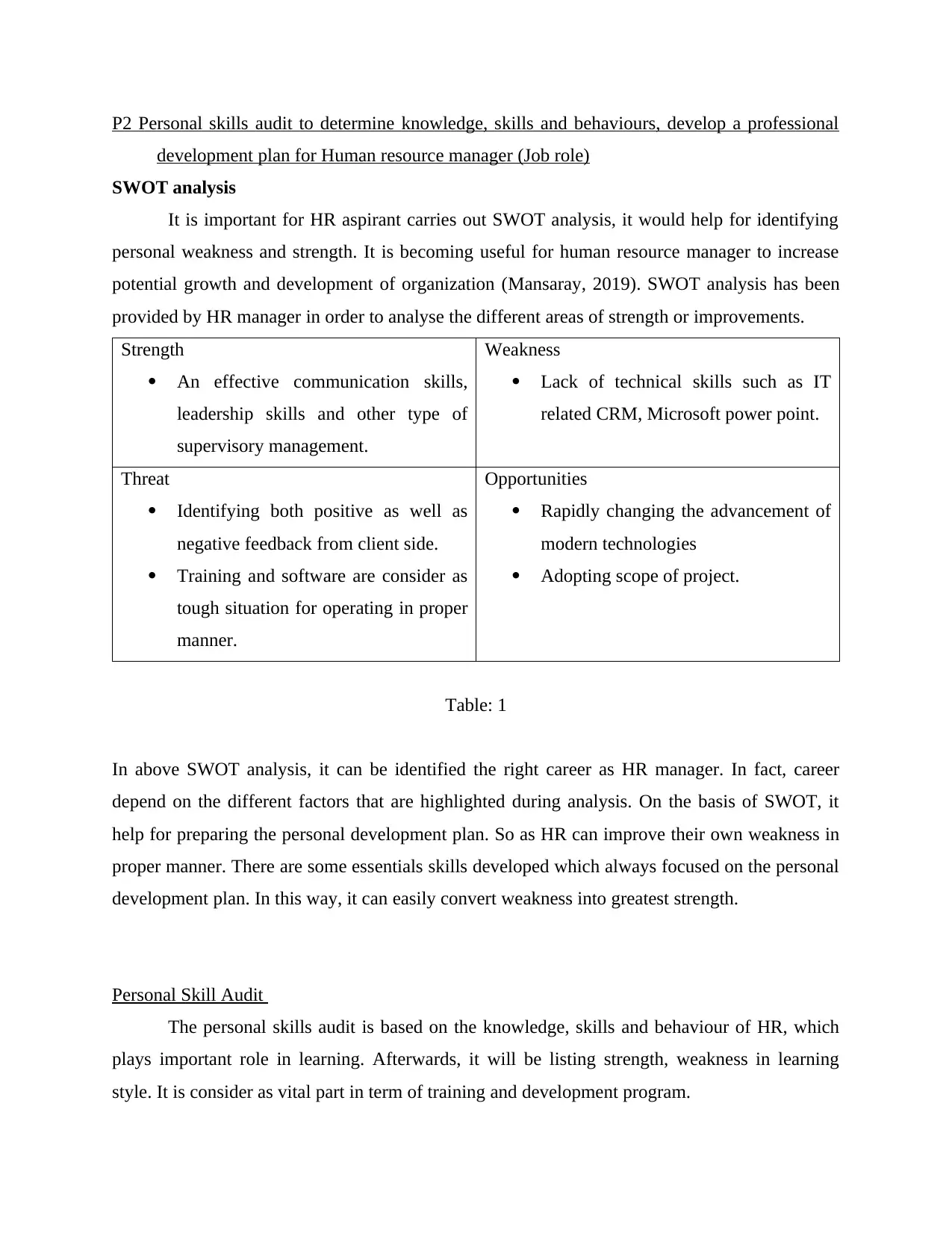
P2 Personal skills audit to determine knowledge, skills and behaviours, develop a professional
development plan for Human resource manager (Job role)
SWOT analysis
It is important for HR aspirant carries out SWOT analysis, it would help for identifying
personal weakness and strength. It is becoming useful for human resource manager to increase
potential growth and development of organization (Mansaray, 2019). SWOT analysis has been
provided by HR manager in order to analyse the different areas of strength or improvements.
Strength
An effective communication skills,
leadership skills and other type of
supervisory management.
Weakness
Lack of technical skills such as IT
related CRM, Microsoft power point.
Threat
Identifying both positive as well as
negative feedback from client side.
Training and software are consider as
tough situation for operating in proper
manner.
Opportunities
Rapidly changing the advancement of
modern technologies
Adopting scope of project.
Table: 1
In above SWOT analysis, it can be identified the right career as HR manager. In fact, career
depend on the different factors that are highlighted during analysis. On the basis of SWOT, it
help for preparing the personal development plan. So as HR can improve their own weakness in
proper manner. There are some essentials skills developed which always focused on the personal
development plan. In this way, it can easily convert weakness into greatest strength.
Personal Skill Audit
The personal skills audit is based on the knowledge, skills and behaviour of HR, which
plays important role in learning. Afterwards, it will be listing strength, weakness in learning
style. It is consider as vital part in term of training and development program.
development plan for Human resource manager (Job role)
SWOT analysis
It is important for HR aspirant carries out SWOT analysis, it would help for identifying
personal weakness and strength. It is becoming useful for human resource manager to increase
potential growth and development of organization (Mansaray, 2019). SWOT analysis has been
provided by HR manager in order to analyse the different areas of strength or improvements.
Strength
An effective communication skills,
leadership skills and other type of
supervisory management.
Weakness
Lack of technical skills such as IT
related CRM, Microsoft power point.
Threat
Identifying both positive as well as
negative feedback from client side.
Training and software are consider as
tough situation for operating in proper
manner.
Opportunities
Rapidly changing the advancement of
modern technologies
Adopting scope of project.
Table: 1
In above SWOT analysis, it can be identified the right career as HR manager. In fact, career
depend on the different factors that are highlighted during analysis. On the basis of SWOT, it
help for preparing the personal development plan. So as HR can improve their own weakness in
proper manner. There are some essentials skills developed which always focused on the personal
development plan. In this way, it can easily convert weakness into greatest strength.
Personal Skill Audit
The personal skills audit is based on the knowledge, skills and behaviour of HR, which
plays important role in learning. Afterwards, it will be listing strength, weakness in learning
style. It is consider as vital part in term of training and development program.
⊘ This is a preview!⊘
Do you want full access?
Subscribe today to unlock all pages.

Trusted by 1+ million students worldwide
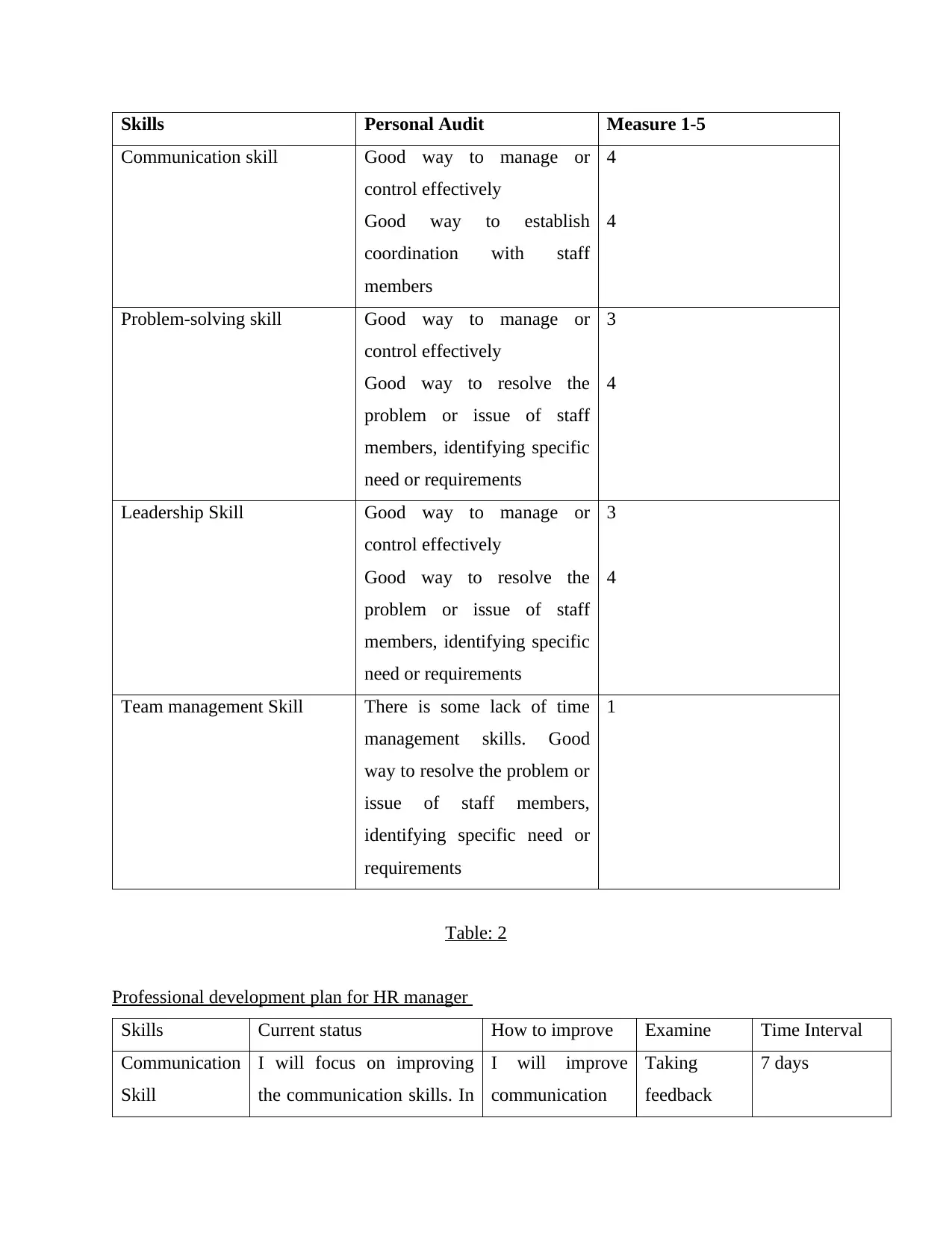
Skills Personal Audit Measure 1-5
Communication skill Good way to manage or
control effectively
Good way to establish
coordination with staff
members
4
4
Problem-solving skill Good way to manage or
control effectively
Good way to resolve the
problem or issue of staff
members, identifying specific
need or requirements
3
4
Leadership Skill Good way to manage or
control effectively
Good way to resolve the
problem or issue of staff
members, identifying specific
need or requirements
3
4
Team management Skill There is some lack of time
management skills. Good
way to resolve the problem or
issue of staff members,
identifying specific need or
requirements
1
Table: 2
Professional development plan for HR manager
Skills Current status How to improve Examine Time Interval
Communication
Skill
I will focus on improving
the communication skills. In
I will improve
communication
Taking
feedback
7 days
Communication skill Good way to manage or
control effectively
Good way to establish
coordination with staff
members
4
4
Problem-solving skill Good way to manage or
control effectively
Good way to resolve the
problem or issue of staff
members, identifying specific
need or requirements
3
4
Leadership Skill Good way to manage or
control effectively
Good way to resolve the
problem or issue of staff
members, identifying specific
need or requirements
3
4
Team management Skill There is some lack of time
management skills. Good
way to resolve the problem or
issue of staff members,
identifying specific need or
requirements
1
Table: 2
Professional development plan for HR manager
Skills Current status How to improve Examine Time Interval
Communication
Skill
I will focus on improving
the communication skills. In
I will improve
communication
Taking
feedback
7 days
Paraphrase This Document
Need a fresh take? Get an instant paraphrase of this document with our AI Paraphraser
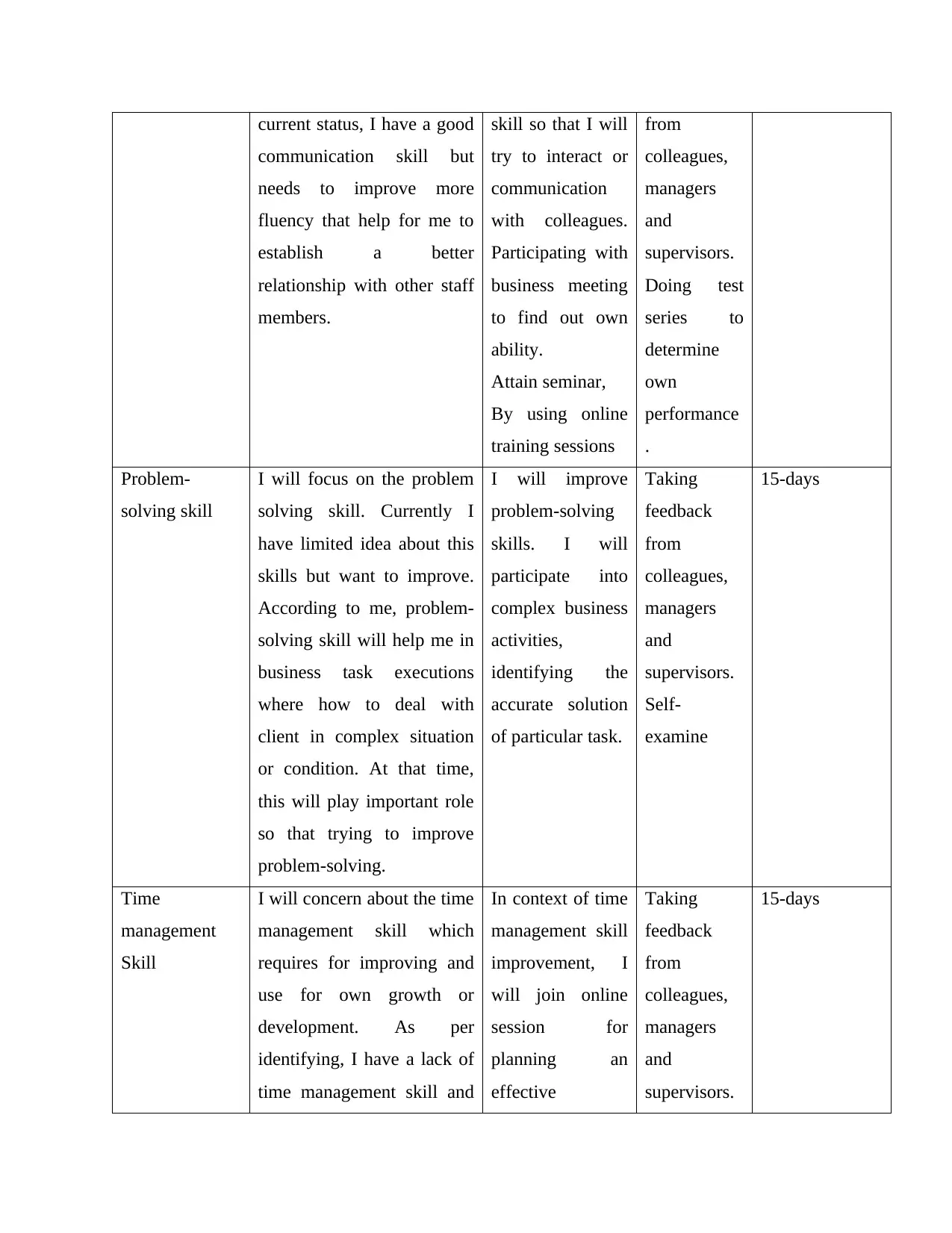
current status, I have a good
communication skill but
needs to improve more
fluency that help for me to
establish a better
relationship with other staff
members.
skill so that I will
try to interact or
communication
with colleagues.
Participating with
business meeting
to find out own
ability.
Attain seminar,
By using online
training sessions
from
colleagues,
managers
and
supervisors.
Doing test
series to
determine
own
performance
.
Problem-
solving skill
I will focus on the problem
solving skill. Currently I
have limited idea about this
skills but want to improve.
According to me, problem-
solving skill will help me in
business task executions
where how to deal with
client in complex situation
or condition. At that time,
this will play important role
so that trying to improve
problem-solving.
I will improve
problem-solving
skills. I will
participate into
complex business
activities,
identifying the
accurate solution
of particular task.
Taking
feedback
from
colleagues,
managers
and
supervisors.
Self-
examine
15-days
Time
management
Skill
I will concern about the time
management skill which
requires for improving and
use for own growth or
development. As per
identifying, I have a lack of
time management skill and
In context of time
management skill
improvement, I
will join online
session for
planning an
effective
Taking
feedback
from
colleagues,
managers
and
supervisors.
15-days
communication skill but
needs to improve more
fluency that help for me to
establish a better
relationship with other staff
members.
skill so that I will
try to interact or
communication
with colleagues.
Participating with
business meeting
to find out own
ability.
Attain seminar,
By using online
training sessions
from
colleagues,
managers
and
supervisors.
Doing test
series to
determine
own
performance
.
Problem-
solving skill
I will focus on the problem
solving skill. Currently I
have limited idea about this
skills but want to improve.
According to me, problem-
solving skill will help me in
business task executions
where how to deal with
client in complex situation
or condition. At that time,
this will play important role
so that trying to improve
problem-solving.
I will improve
problem-solving
skills. I will
participate into
complex business
activities,
identifying the
accurate solution
of particular task.
Taking
feedback
from
colleagues,
managers
and
supervisors.
Self-
examine
15-days
Time
management
Skill
I will concern about the time
management skill which
requires for improving and
use for own growth or
development. As per
identifying, I have a lack of
time management skill and
In context of time
management skill
improvement, I
will join online
session for
planning an
effective
Taking
feedback
from
colleagues,
managers
and
supervisors.
15-days
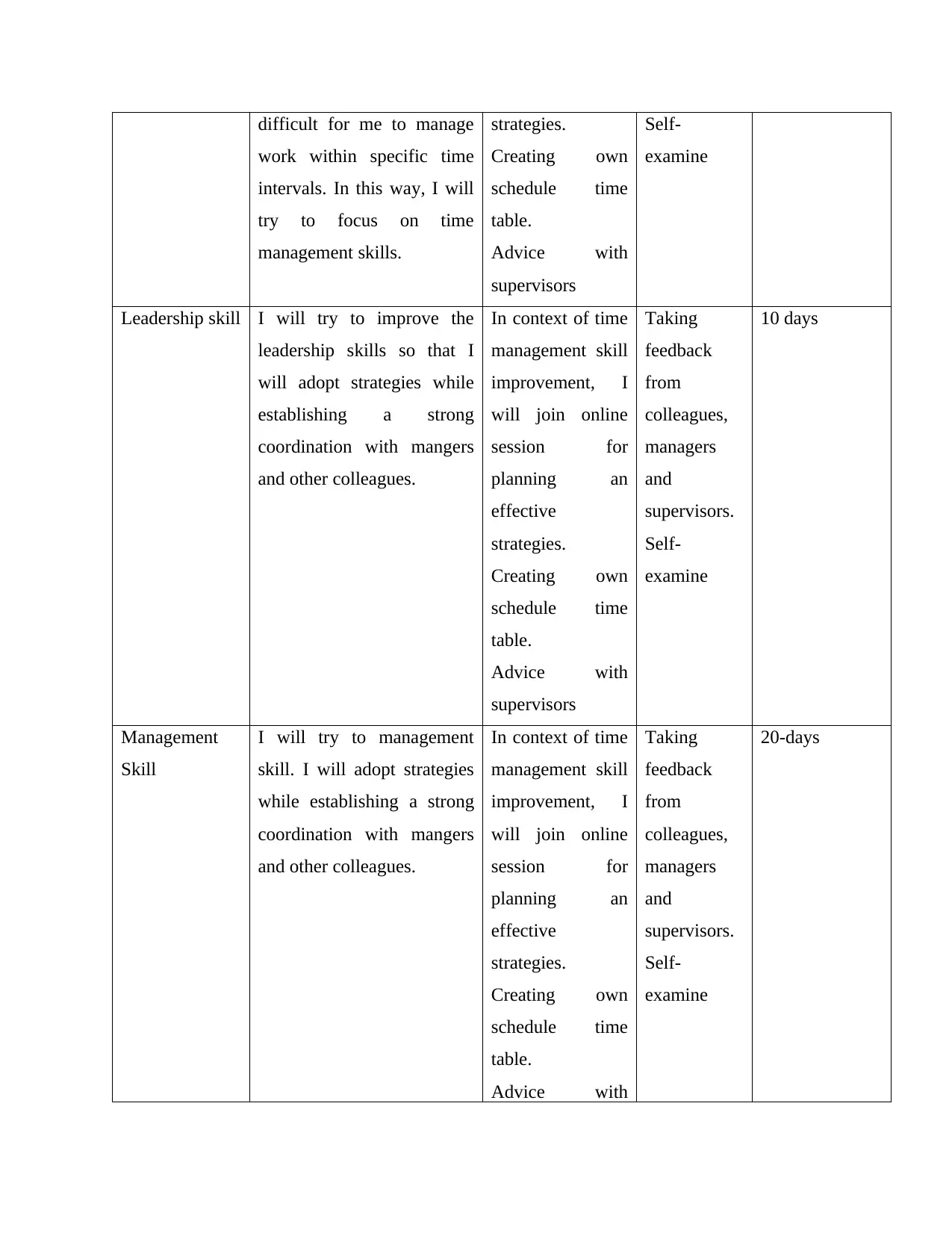
difficult for me to manage
work within specific time
intervals. In this way, I will
try to focus on time
management skills.
strategies.
Creating own
schedule time
table.
Advice with
supervisors
Self-
examine
Leadership skill I will try to improve the
leadership skills so that I
will adopt strategies while
establishing a strong
coordination with mangers
and other colleagues.
In context of time
management skill
improvement, I
will join online
session for
planning an
effective
strategies.
Creating own
schedule time
table.
Advice with
supervisors
Taking
feedback
from
colleagues,
managers
and
supervisors.
Self-
examine
10 days
Management
Skill
I will try to management
skill. I will adopt strategies
while establishing a strong
coordination with mangers
and other colleagues.
In context of time
management skill
improvement, I
will join online
session for
planning an
effective
strategies.
Creating own
schedule time
table.
Advice with
Taking
feedback
from
colleagues,
managers
and
supervisors.
Self-
examine
20-days
work within specific time
intervals. In this way, I will
try to focus on time
management skills.
strategies.
Creating own
schedule time
table.
Advice with
supervisors
Self-
examine
Leadership skill I will try to improve the
leadership skills so that I
will adopt strategies while
establishing a strong
coordination with mangers
and other colleagues.
In context of time
management skill
improvement, I
will join online
session for
planning an
effective
strategies.
Creating own
schedule time
table.
Advice with
supervisors
Taking
feedback
from
colleagues,
managers
and
supervisors.
Self-
examine
10 days
Management
Skill
I will try to management
skill. I will adopt strategies
while establishing a strong
coordination with mangers
and other colleagues.
In context of time
management skill
improvement, I
will join online
session for
planning an
effective
strategies.
Creating own
schedule time
table.
Advice with
Taking
feedback
from
colleagues,
managers
and
supervisors.
Self-
examine
20-days
⊘ This is a preview!⊘
Do you want full access?
Subscribe today to unlock all pages.

Trusted by 1+ million students worldwide
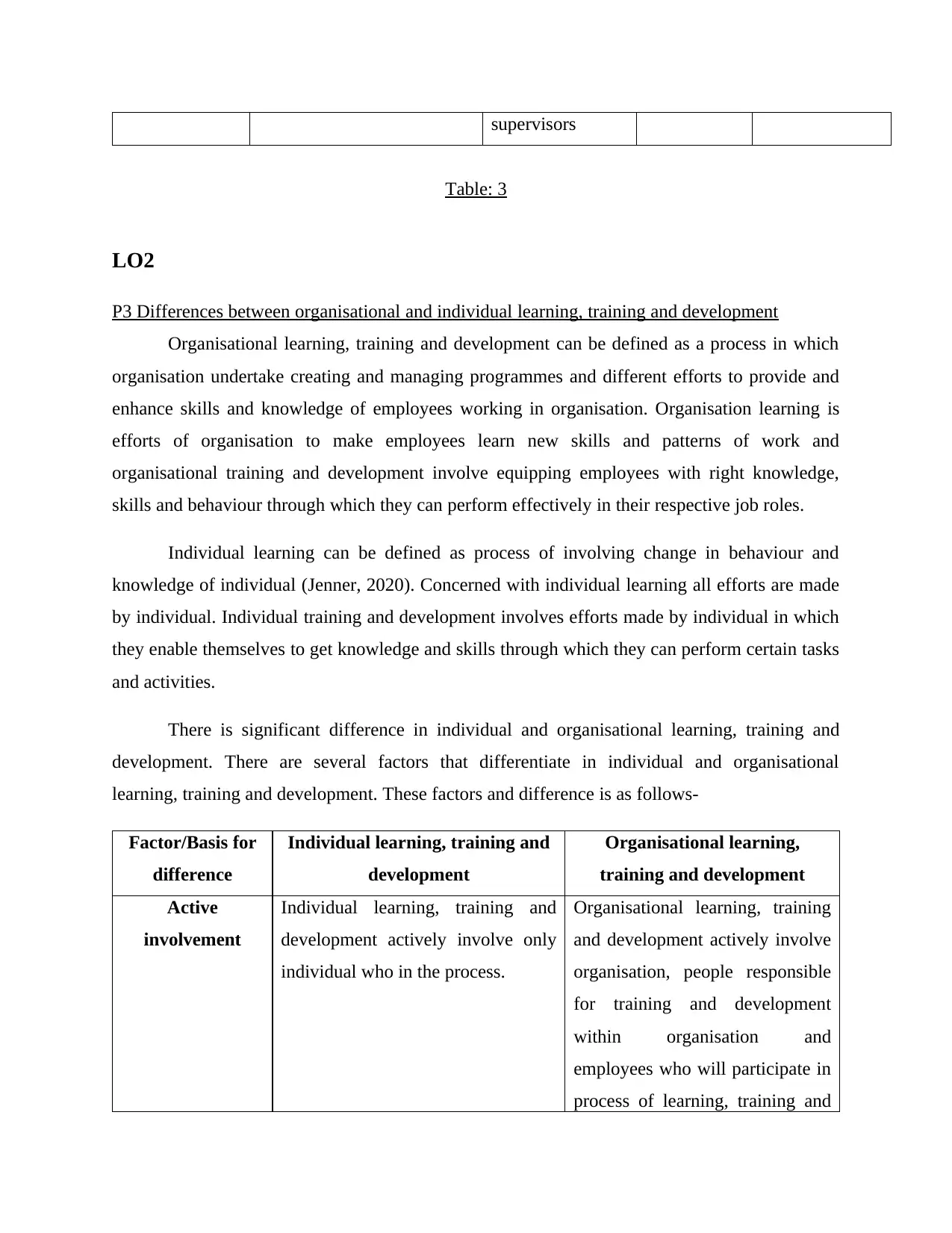
supervisors
Table: 3
LO2
P3 Differences between organisational and individual learning, training and development
Organisational learning, training and development can be defined as a process in which
organisation undertake creating and managing programmes and different efforts to provide and
enhance skills and knowledge of employees working in organisation. Organisation learning is
efforts of organisation to make employees learn new skills and patterns of work and
organisational training and development involve equipping employees with right knowledge,
skills and behaviour through which they can perform effectively in their respective job roles.
Individual learning can be defined as process of involving change in behaviour and
knowledge of individual (Jenner, 2020). Concerned with individual learning all efforts are made
by individual. Individual training and development involves efforts made by individual in which
they enable themselves to get knowledge and skills through which they can perform certain tasks
and activities.
There is significant difference in individual and organisational learning, training and
development. There are several factors that differentiate in individual and organisational
learning, training and development. These factors and difference is as follows-
Factor/Basis for
difference
Individual learning, training and
development
Organisational learning,
training and development
Active
involvement
Individual learning, training and
development actively involve only
individual who in the process.
Organisational learning, training
and development actively involve
organisation, people responsible
for training and development
within organisation and
employees who will participate in
process of learning, training and
Table: 3
LO2
P3 Differences between organisational and individual learning, training and development
Organisational learning, training and development can be defined as a process in which
organisation undertake creating and managing programmes and different efforts to provide and
enhance skills and knowledge of employees working in organisation. Organisation learning is
efforts of organisation to make employees learn new skills and patterns of work and
organisational training and development involve equipping employees with right knowledge,
skills and behaviour through which they can perform effectively in their respective job roles.
Individual learning can be defined as process of involving change in behaviour and
knowledge of individual (Jenner, 2020). Concerned with individual learning all efforts are made
by individual. Individual training and development involves efforts made by individual in which
they enable themselves to get knowledge and skills through which they can perform certain tasks
and activities.
There is significant difference in individual and organisational learning, training and
development. There are several factors that differentiate in individual and organisational
learning, training and development. These factors and difference is as follows-
Factor/Basis for
difference
Individual learning, training and
development
Organisational learning,
training and development
Active
involvement
Individual learning, training and
development actively involve only
individual who in the process.
Organisational learning, training
and development actively involve
organisation, people responsible
for training and development
within organisation and
employees who will participate in
process of learning, training and
Paraphrase This Document
Need a fresh take? Get an instant paraphrase of this document with our AI Paraphraser
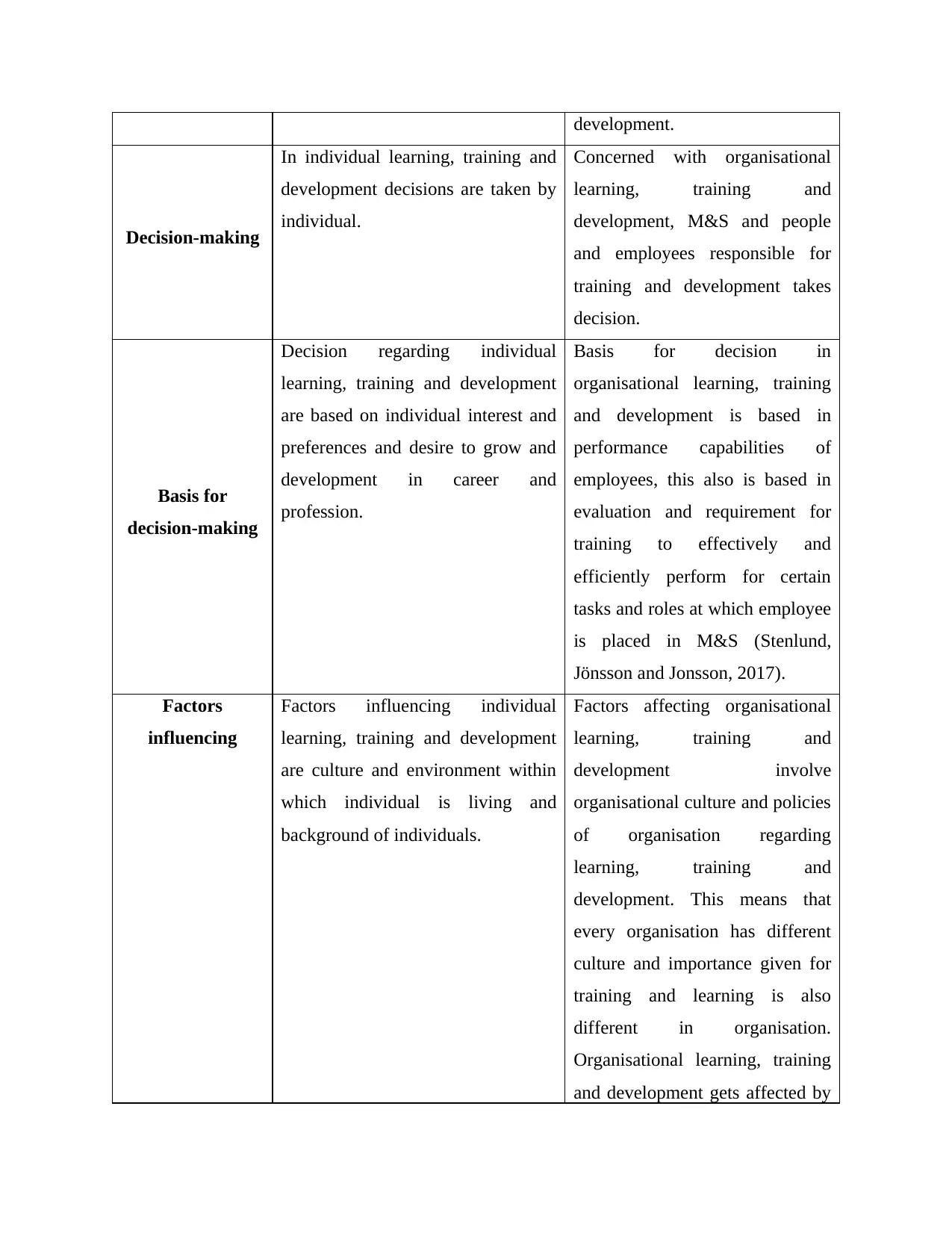
development.
Decision-making
In individual learning, training and
development decisions are taken by
individual.
Concerned with organisational
learning, training and
development, M&S and people
and employees responsible for
training and development takes
decision.
Basis for
decision-making
Decision regarding individual
learning, training and development
are based on individual interest and
preferences and desire to grow and
development in career and
profession.
Basis for decision in
organisational learning, training
and development is based in
performance capabilities of
employees, this also is based in
evaluation and requirement for
training to effectively and
efficiently perform for certain
tasks and roles at which employee
is placed in M&S (Stenlund,
Jönsson and Jonsson, 2017).
Factors
influencing
Factors influencing individual
learning, training and development
are culture and environment within
which individual is living and
background of individuals.
Factors affecting organisational
learning, training and
development involve
organisational culture and policies
of organisation regarding
learning, training and
development. This means that
every organisation has different
culture and importance given for
training and learning is also
different in organisation.
Organisational learning, training
and development gets affected by
Decision-making
In individual learning, training and
development decisions are taken by
individual.
Concerned with organisational
learning, training and
development, M&S and people
and employees responsible for
training and development takes
decision.
Basis for
decision-making
Decision regarding individual
learning, training and development
are based on individual interest and
preferences and desire to grow and
development in career and
profession.
Basis for decision in
organisational learning, training
and development is based in
performance capabilities of
employees, this also is based in
evaluation and requirement for
training to effectively and
efficiently perform for certain
tasks and roles at which employee
is placed in M&S (Stenlund,
Jönsson and Jonsson, 2017).
Factors
influencing
Factors influencing individual
learning, training and development
are culture and environment within
which individual is living and
background of individuals.
Factors affecting organisational
learning, training and
development involve
organisational culture and policies
of organisation regarding
learning, training and
development. This means that
every organisation has different
culture and importance given for
training and learning is also
different in organisation.
Organisational learning, training
and development gets affected by
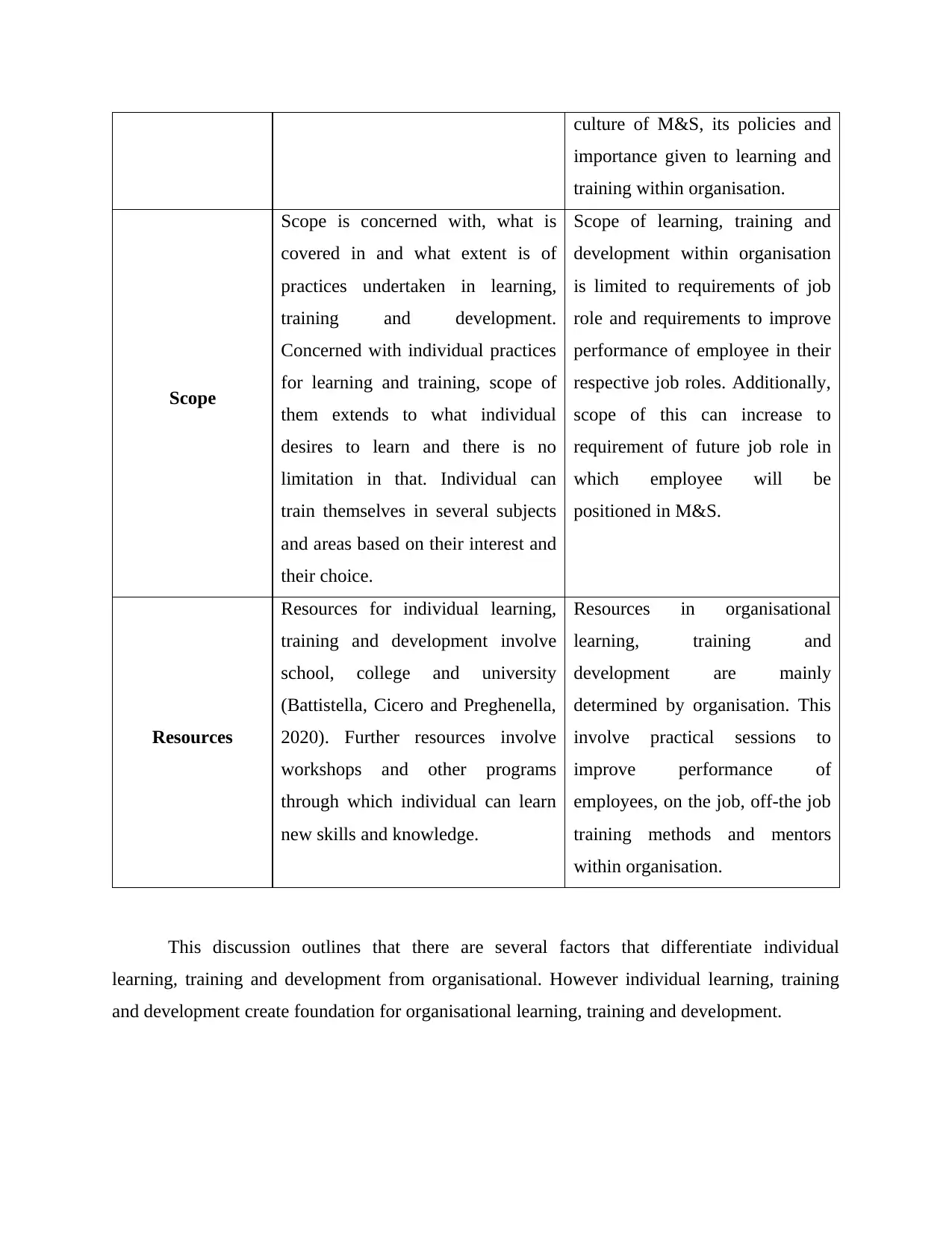
culture of M&S, its policies and
importance given to learning and
training within organisation.
Scope
Scope is concerned with, what is
covered in and what extent is of
practices undertaken in learning,
training and development.
Concerned with individual practices
for learning and training, scope of
them extends to what individual
desires to learn and there is no
limitation in that. Individual can
train themselves in several subjects
and areas based on their interest and
their choice.
Scope of learning, training and
development within organisation
is limited to requirements of job
role and requirements to improve
performance of employee in their
respective job roles. Additionally,
scope of this can increase to
requirement of future job role in
which employee will be
positioned in M&S.
Resources
Resources for individual learning,
training and development involve
school, college and university
(Battistella, Cicero and Preghenella,
2020). Further resources involve
workshops and other programs
through which individual can learn
new skills and knowledge.
Resources in organisational
learning, training and
development are mainly
determined by organisation. This
involve practical sessions to
improve performance of
employees, on the job, off-the job
training methods and mentors
within organisation.
This discussion outlines that there are several factors that differentiate individual
learning, training and development from organisational. However individual learning, training
and development create foundation for organisational learning, training and development.
importance given to learning and
training within organisation.
Scope
Scope is concerned with, what is
covered in and what extent is of
practices undertaken in learning,
training and development.
Concerned with individual practices
for learning and training, scope of
them extends to what individual
desires to learn and there is no
limitation in that. Individual can
train themselves in several subjects
and areas based on their interest and
their choice.
Scope of learning, training and
development within organisation
is limited to requirements of job
role and requirements to improve
performance of employee in their
respective job roles. Additionally,
scope of this can increase to
requirement of future job role in
which employee will be
positioned in M&S.
Resources
Resources for individual learning,
training and development involve
school, college and university
(Battistella, Cicero and Preghenella,
2020). Further resources involve
workshops and other programs
through which individual can learn
new skills and knowledge.
Resources in organisational
learning, training and
development are mainly
determined by organisation. This
involve practical sessions to
improve performance of
employees, on the job, off-the job
training methods and mentors
within organisation.
This discussion outlines that there are several factors that differentiate individual
learning, training and development from organisational. However individual learning, training
and development create foundation for organisational learning, training and development.
⊘ This is a preview!⊘
Do you want full access?
Subscribe today to unlock all pages.

Trusted by 1+ million students worldwide
1 out of 21
Related Documents
Your All-in-One AI-Powered Toolkit for Academic Success.
+13062052269
info@desklib.com
Available 24*7 on WhatsApp / Email
![[object Object]](/_next/static/media/star-bottom.7253800d.svg)
Unlock your academic potential
Copyright © 2020–2026 A2Z Services. All Rights Reserved. Developed and managed by ZUCOL.




